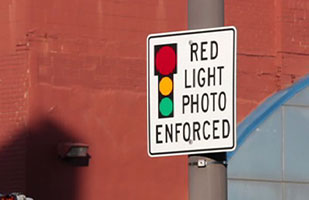City Appeals Process for Traffic Camera Violations Does Not Infringe on Jurisdiction of Courts

The Ohio Supreme Court ruled today that Toledo’s hearing process for red-light camera infractions is constitutional.

The Ohio Supreme Court ruled today that Toledo’s hearing process for red-light camera infractions is constitutional.
The Ohio Supreme Court today upheld Toledo’s automated traffic camera system used to catch red-light and speeding violations.
In a 4-3 decision, the court determined that the legislature’s constitutional authority to create municipal courts and the statute defining the jurisdiction of municipal courts do not give municipal courts exclusive control over traffic law violations.
In addition, Ohio municipalities have home-rule authority to establish administrative proceedings related to civil enforcement of traffic ordinances, and those proceedings must be exhausted before parties can seek remedies in the courts, Justice Sharon L. Kennedy wrote in the court’s majority opinion.
The court also reaffirmed its ruling in Mendenhall v. Akron (2008) that municipalities have constitutional home-rule authority to impose civil liability on traffic violators through an administrative enforcement system.
The city of Toledo enacted an ordinance in 2008 to establish an automated system, which uses cameras and vehicle sensors, to enforce traffic laws. The equipment is provided by Redflex Traffic Systems, Inc., which shares revenue with the city. The cameras capture photos, video, or digital images of vehicles running red lights or speeding. The city then forwards a notice of civil liability assessing a $120 fine to the registered owner of the vehicle. The notice is not a criminal citation and imposes no other penalties, such as points on the owner’s driver’s license.
The vehicle owner must pay the penalty or file an appeal within 21 days of the date on the notice. Appeals are handled through an administrative hearing process set up by the Toledo police department. Further appeals may be taken to the county common pleas court.
Bradley L. Walker received a traffic violation notice in 2009. He paid the fine and did not appeal through the administrative process. He later filed a class action lawsuit against Toledo and Redflex.
The trial court dismissed Walker’s lawsuit for failing to state a claim for which relief can be granted. He appealed, and the Sixth District Court of Appeals reversed.
Toledo and Redflex appealed to the Ohio Supreme Court on whether Toledo’s civil administrative enforcement process violates the Ohio Constitution or state law.
Justice Kennedy pointed out that the court already ruled in Mendenhall that automated systems imposing civil liability for traffic law violations are within municipalities’ home-rule powers granted in the state constitution.
The state constitution also gives the General Assembly authority to create municipal courts in Article IV, Section 1, and R.C. 1901.20 sets the jurisdiction of those courts. But R.C. 1901.20 does not give municipal courts exclusive jurisdiction over all traffic law infractions, and the Toledo ordinance does not infringe on the jurisdiction of the Toledo Municipal Court, Justice Kennedy reasoned.
“[T]he reality of municipal civil enforcement of ordinances does not involve regulating the jurisdiction of courts,” she explained. “As we made clear in Mendenhall, civil enforcement of municipal ordinances complements the work of the courts. It does not restrict it. … Neither R.C. 1901.20 nor Ohio Constitution, Article IV, Section 1 undermines our analysis in Mendenhall.”
“The court of appeals misread Mendenhall,” she wrote. “Our holding that a complementary system of civil enforcement of traffic laws is within a municipality’s home-rule power acknowledges that administrative procedures must be established in furtherance of this power.”
“[W]e hold that Ohio municipalities have home-rule authority to establish administrative proceedings, including administrative hearings, in furtherance of these ordinances, that must be exhausted before offenders or the municipality can pursue judicial remedies,” Justice Kennedy concluded.
The case now returns to the trial court for additional proceedings in line with this opinion.
The majority opinion was joined by Chief Justice Maureen O’Connor, Justice Judith Ann Lanzinger, and Judge W. Scott Gwin of the Fifth District Court of Appeals. Judge Gwin sat in place of Justice Terrence O’Donnell, who recused himself.
Justice William M. O’Neill dissented in an opinion joined by Justices Paul E. Pfeifer and Judith L. French.
Justice O’Neill concluded that a city council does not have the power to limit a municipal court’s jurisdiction in these types of cases.
“[T]he Toledo City Council has divested the Toledo Municipal Court of part of its jurisdiction by vesting jurisdiction over traffic-camera cases in a hearing officer,” Justice O’Neill wrote. “A hearing officer is simply not a substitute for a municipal court judge who has been elected to preside over judicial matters. [Toledo’s traffic camera system] is a direct infringement of the municipal court’s jurisdiction as well as the legislature’s right to confer jurisdiction on the court and the right of the general population to elect those empowered to determine whether laws have been violated.”
He also disputed the majority’s reliance on Mendenhall.
“The present case is not about home rule and does not implicate Mendenhall,” he reasoned. “It is solely about the jurisdiction of the Toledo Municipal Court and whether [the Toledo ordinance] unlawfully intrudes upon and reduces that jurisdiction. It does.”
2013-1277. Walker v. Toledo, Slip Opinion No. 2014-Ohio-5461.
 View oral argument video of this case.
View oral argument video of this case.
Please note: Opinion summaries are prepared by the Office of Public Information for the general public and news media. Opinion summaries are not prepared for every opinion, but only for noteworthy cases. Opinion summaries are not to be considered as official headnotes or syllabi of court opinions. The full text of this and other court opinions are available online.
Acrobat Reader is a trademark of Adobe Systems Incorporated.


